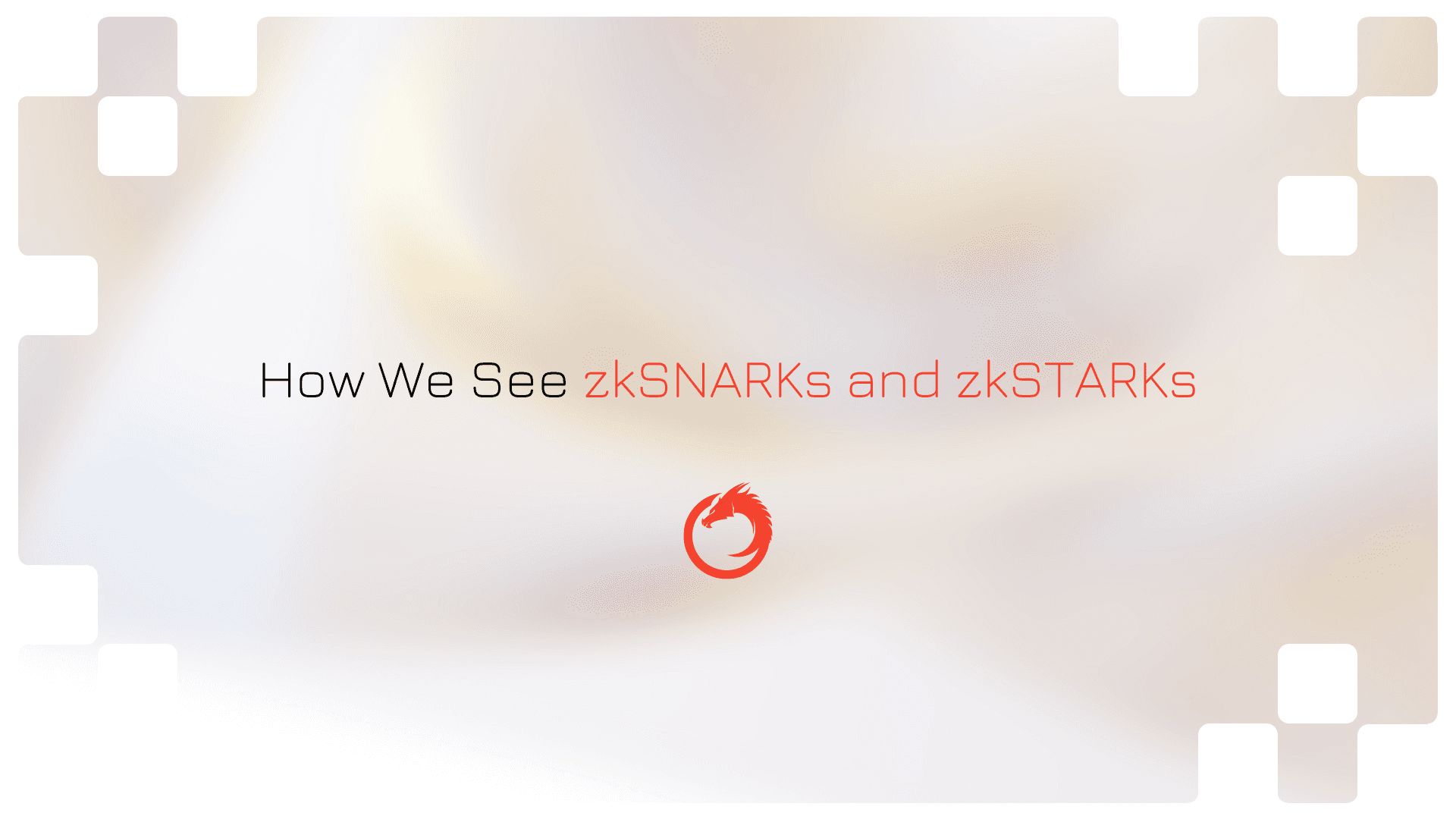How We See zkSNARKs and zkSTARKs

Zero-Knowledge Proofs have revolutionized the way we think about privacy and security within blockchain space. Two prominent ZKP systems, zkSNARKs and zkSTARKs, have emerged as powerful tools. While they both serve similar purposes, they each bring unique strengths to the table.
In this blog, we’ll break them down in simple terms and explore what makes these two methods distinct, with a special look at how Orochi Network is leveraging them to build a robust ecosystem.
What are zkSNARKs?
zkSNARKs, or Zero-Knowledge Succinct Non-Interactive Arguments of Knowledge, are a type of ZKP that allows for quick and non-interactive verification. This technology gained popularity through its implementation in privacy-focused cryptocurrencies like Zcash.
Key Features of zkSNARKs
zkSNARKs are known for being:
Succinct: Proofs are small and quick to verify.
Non-interactive: The verification process does not require back-and-forth communication between the prover and verifier, making it highly efficient.
Widely adopted: zkSNARKs are already well-established in the blockchain space, providing a tested framework for secure and private transactions.
zkSNARKs are recognized for their concise proof size, making verification both fast and non-interactive, which means no back-and-forth is needed between the prover and verifier. Their established presence in blockchain applications, particularly those focused on privacy, underscores their reliability in secure transactions.
Advantages of zkSNARKs include their efficiency and compatibility with privacy-centric systems like Zcash. However, they require a “trusted setup” to create cryptographic keys—a step that introduces a security risk if compromised. Additionally, zkSNARKs may be vulnerable to potential future quantum attacks.
What are zkSTARKs?
zkSTARKs, or Zero-Knowledge Scalable Transparent Arguments of Knowledge, offer a more transparent and scalable approach to zero-knowledge proofs. Developed as an improvement over zkSNARKs, zkSTARKs eliminate the need for a trusted setup, which addresses some of the security concerns associated with zkSNARKs.
Key Features of zkSTARKs
zkSTARKs are characterized by:
Transparency: They eliminate the need for a trusted setup, relying instead on publicly verifiable randomness.
Scalability: zkSTARKs can handle larger proofs, making them more suitable for complex applications.
Quantum resistance: zkSTARKs are resistant to attacks from quantum computers, providing a future-proof solution.
zkSTARKs are known for their transparency, as they remove the need for a trusted setup and instead rely on publicly verifiable randomness. This makes them scalable, capable of handling larger proofs, and more suited to complex applications. Additionally, zkSTARKs are quantum-resistant, providing security against future quantum threats.
Their main benefits include increased security without a trusted setup, enhanced scalability for complex computations, and quantum resistance. However, the larger proof sizes can be a drawback, as they may be less efficient in bandwidth-limited environments.
zkSNARKs and zkSTARKs in Comparison
Security: Trusted Setup vs. Transparent
zkSNARKs require a trusted setup, meaning a one-time generation of cryptographic keys. If these keys were ever exposed, it could compromise the entire system’s security. zkSTARKs, on the other hand, use transparent setups, which eliminate this risk by relying on public randomness, making zkSTARKs a more secure option in this regard.
Scalability and Efficiency
While zkSTARKs offer greater scalability due to their ability to handle larger proofs, zkSNARKs are generally more efficient in bandwidth-constrained settings. For applications needing high throughput with limited data capacity, zkSNARKs might still be preferable. However, zkSTARKs are better suited for complex applications requiring larger-scale computation.
Quantum Resistance
Quantum computing poses a potential threat to many cryptographic techniques, and zkSTARKs have an edge here, being inherently resistant to quantum attacks. As quantum computing technology advances, zkSTARKs’ resistance could become a significant advantage, especially for long-term projects requiring robust security.
Applications and Use Cases
Where zkSNARKs Shine
zkSNARKs are already widely implemented in privacy-focused blockchains like Zcash. Their efficient, non-interactive nature makes them suitable for applications where privacy and speed are paramount, such as anonymous transactions and privacy-preserving applications.
The Potential of zkSTARKs in Scaling Solutions
Due to their transparency and scalability, zkSTARKs are increasingly being adopted for Layer 2 scaling solutions, where high security and scalability are essential. For projects with more complex computations, zkSTARKs offer a more versatile and secure option.
Orochi Leverage zkSNARK and zkSTARK
Orochi Network leverages both zkSNARKs and zkSTARKs to enhance its ZK Modular Data Availability Layer (zkMDAL).
zkSNARKs are utilized to provide succinct proofs for on-chain and off-chain interoperability. These proofs establish cryptographic verification, enabling secure layer-to-layer interactions. zkMDAL natively supports ZKPs, allowing us to optimize performance by selecting the most suitable commitment schemes and ZKPs for each blockchain platform.
In the upcoming development stage of zkMDAL, zkSTARKs will be instrumental in our proof systems. We're committed to leveraging ZKPs to optimize data processing efficiency and verifiability. Our goal is to empower developers to concentrate on building innovative applications, while zkMDAL handles the intricate challenges of data integrity and availability.
Conclusion
We're excited about the potential of both zkSNARKs and zkSTARKs. By strategically leveraging both technologies, we're building a modular, blockchain-agnostic ecosystem that empowers developers to create innovative Web3 applications without the complexities of data integrity and availability. Our zkMDAL is a testament to the power of zero-knowledge proofs, setting a new standard for security, privacy, and scalability in the blockchain industry.
About Orochi Network
Orochi Network is the world's first zkDA Layer, recognized by the Ethereum Foundation. By leveraging Zero-Knowledge Proofs (ZKPs), Orochi ensures data integrity, security, and interoperability, empowering developers with the tools to overcome the limitations of on-chain execution and scalability in Web3. At the core, Orochi offers the world's first verifiable database designed for enterprises, AI/ML, zkML, zkVMs, verifiable computation, Web3 applications, and more.
